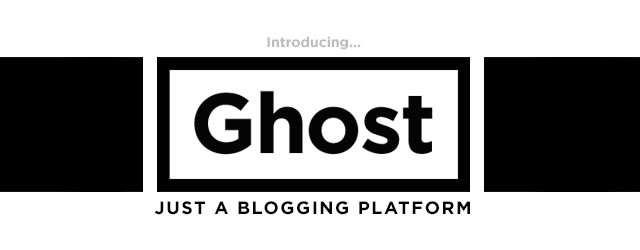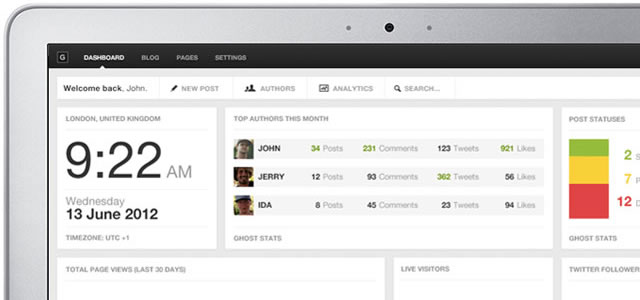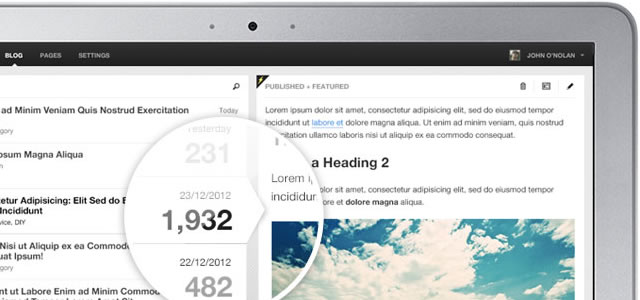It is a well known fact that WordPress is the most popular CMS today, and it powers websites from different niche and genres. In fact, even though it once began as a blogging tool, WordPress today has risen to great heights, catering to the needs of news websites, online portfolios, eCommerce sites as well as corporate websites, among many others.
However, in the light of such diverse uses, you have to wonder: has WordPress out-grown its blogging platform status? John O’Nolan has attempted to answer this question by talking about his new project called Ghost.
What is Ghost all about?
All can be traced back to Matt Mullenweg’s quote at State of the Word 2012: “66% of [users] said they use WordPress as a CMS and not as a blog.”
While there is no denying the fact that the beauty of WordPress lies in its ability to serve a wide audience, there is also a downside attached to it: WordPress is becoming more and more CMS-like, and its real prowess of being a publishers’ and bloggers’ best friend is getting lost amongst all this.

Of course, WordPress is probably better than most CMSs. However, it probably is no longer custom-made for blog publishing, and this very characteristic (or lack thereof) urged O’Nolan to com up with a solution, and he came up with Ghost.
Alright, so what exactly will Ghost do?

The initial plan for Ghost was to fork WordPress itself. Here is how O’Nolan describes his plan:
- Revamped Dashboard and Interface: Ghost, according to O’Nolan, would have a Dashboard built for content publishers and bloggers. Similarly, the interface will make life easier by allowing you to “manage posts by actually seeing them”.
- Writing Screen: Ghost is said to have a writing screen with a split view. But that’s not all. Unlike WordPress, you will not have to hop between keyboard and mouse to apply formatting. Plus, if you fancy Markdown, you’re gonna love this even more!
- Less Tweaks: Ghost aims to do away with stuff such as admin color schemes, QuickPress, PressThis, Email-to-Post, Remote Publishing, etc.
- No Native Commenting System: Ghost will have support for third-party systems, such as Disqus or Livefyre, but by its own accord, it will not have a native commenting mechanism.
- Limited Backwards Compatibility: I’ll let O’Nolan speak about this himself, “Ghost would have cut-off points with major versions, allowing core developers to remove old code from the database and evolve the platform to allow it to improve. No one expects an app written for OSX 10.4 Tiger to work on OSX 10.8 Mountain Lion.”
- Lesser Plugins: Again, another step towards being less bloated.
- Truly, Open Source: The development would be open, and Ghost will be an entirely open source project. Since O’Nolan wrote that “Ghost would be free as in Mozilla, not as in Automattic”, I suppose Ghost may probably have an MPL, not GPL.
And… how well has Ghost been received?
Owing to the volume of positive feedback O’Nolan has received, he has stated that he will most likely pursue the development of Ghost and bring it into existence. Which is very exciting!

As of now, on the basis of suggestions from others and feedback to his initial idea, O’Nolan has talked about three potential routes:
- As a WordPress Fork: This has been the initial concept: make use of the WP codebase, and evolve it into a project that serves content creators.
- As a WP Plugin: Probably change /wp-admin to /ghost — easy to deploy and create, and doesn’t offend WordPress loyalists either.
- As a New Entity: To be fair, if you are forking WordPress, you’ll end up changing the codebase too much, and if you are really going to do that much editing, you might as well create a new software! (O’Nolan attributes this option to the responses at Hacker News).
Once again, it is still a concept, and the final route is obviously likely to change.
To Sum it Up…
Confession: I like the idea of Ghost.
Reason: Don’t get me wrong; I love WordPress! But of late, I’ve been favoring Habari and Wolf over WordPress for some of my smaller web projects. Why? Simply because I find the WordPress editor to be super-annoying at times, and the CMS itself is only one step short of becoming another semi-bloated Drupal. For running stuff such as a personal blog, WordPress is no longer my first choice.
What do you think of Ghost? Share your thoughts with us in the comments!
Related Topics
Top